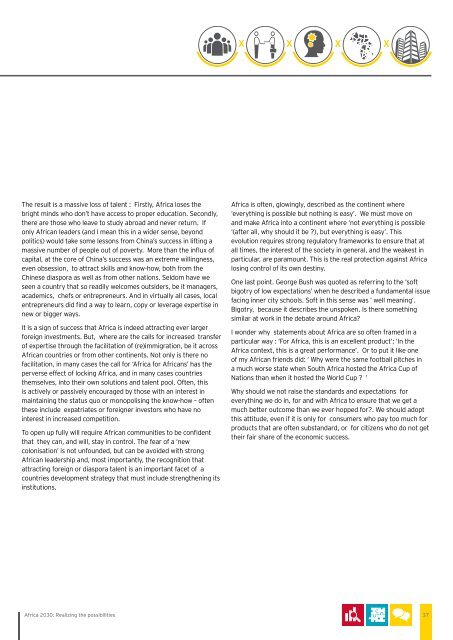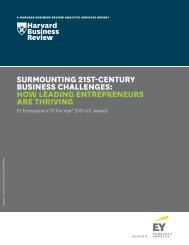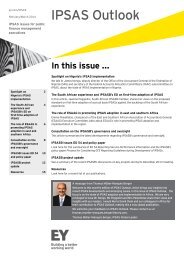You also want an ePaper? Increase the reach of your titles
YUMPU automatically turns print PDFs into web optimized ePapers that Google loves.
The result is a massive loss of talent : Firstly, Africa loses thebright minds who don’t have access to proper education. Secondly,there are those who leave to study abroad and never return. Ifonly African leaders (and I mean this in a wider sense, beyondpolitics) would take some lessons from China’s success in lifting amassive number of people out of poverty. More than the influx ofcapital, at the core of China’s success was an extreme willingness,even obsession, to attract skills and know-how, both from theChinese diaspora as well as from other nations. Seldom have weseen a country that so readily welcomes outsiders, be it managers,academics, chefs or entrepreneurs. And in virtually all cases, localentrepreneurs did find a way to learn, copy or leverage expertise innew or bigger ways.It is a sign of success that Africa is indeed attracting ever largerforeign investments. But, where are the calls for increased transferof expertise through the facilitation of (re)immigration, be it acrossAfrican countries or from other continents. Not only is there nofacilitation, in many cases the call for ‘Africa for Africans’ has theperverse effect of locking Africa, and in many cases countriesthemselves, into their own solutions and talent pool. Often, thisis actively or passively encouraged by those with an interest inmaintaining the status quo or monopolising the know-how – oftenthese include expatriates or foreigner investors who have nointerest in increased competition.To open up fully will require African communities to be confidentthat they can, and will, stay in control. The fear of a ‘newcolonisation’ is not unfounded, but can be avoided with strongAfrican leadership and, most importantly, the recognition thatattracting foreign or diaspora talent is an important facet of acountries development strategy that must include strengthening itsinstitutions.Africa is often, glowingly, described as the continent where‘everything is possible but nothing is easy’. We must move onand make Africa into a continent where ‘not everything is possible‘(after all, why should it be ?), but everything is easy’. Thisevolution requires strong regulatory frameworks to ensure that atall times, the interest of the society in general, and the weakest inparticular, are paramount. This is the real protection against Africalosing control of its own destiny.One last point. George Bush was quoted as referring to the ‘softbigotry of low expectations’ when he described a fundamental issuefacing inner city schools. Soft in this sense was ’ well meaning’.Bigotry, because it describes the unspoken. Is there somethingsimilar at work in the debate around Africa?I wonder why statements about Africa are so often framed in aparticular way : ‘For Africa, this is an excellent product’; ‘In theAfrica context, this is a great performance’. Or to put it like oneof my African friends did: ‘ Why were the same football pitches ina much worse state when South Africa hosted the Africa Cup ofNations than when it hosted the World Cup ? ’Why should we not raise the standards and expectations foreverything we do in, for and with Africa to ensure that we get amuch better outcome than we ever hopped for?. We should adoptthis attitude, even if it is only for consumers who pay too much forproducts that are often substandard, or for citizens who do not gettheir fair share of the economic success.Africa 2030: Realizing the possibilities37





